Teaching on the move Inspire article
Jeanne Keweloh is a substitute teacher, going wherever she is needed to share her passion for science. She tells Sonia Furtado about the ups and downs of teaching on the move, and shares some of her strategies.
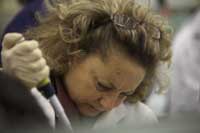
an ELLS workshop
Image courtesy of EMBL Photolab
When a staff science teacher is sick or on leave at a secondary school in Lower Saxony, Germany, Jeanne Keweloh comes to the rescue. She takes on the class, and teaches biology, chemistry and/or physics, according to the school’s needs. Two or three months later, she moves to another school and starts all over again. “It’s not easy, being a ‘travelling’ substitute teacher,” she says. “I have a new school every few months – sometimes even more than one school at the same time – and every school has its own style. There are new students, new colleagues, and new topics to teach, because although there is a common curriculum for all schools in Lower Saxony, each school develops its own detailed curriculum within those limits.
Occasionally, I attend the teacher’s classes before I start, to have a clearer idea. Generally, however, I only meet the teacher I substitute for at the end of my stay (if at all), so I have to figure things out for myself. Usually, the head of department and I agree on how to proceed. Of course I have to make sure that my grading is fair, so I check previous grades for orientation and discuss some cases with the head teacher, if necessary. I also learn a lot from my colleagues. The older ones have tremendous experience, and I sometimes seek their advice or attend their classes to see how they do things. It takes a lot of energy and I have to adapt to every school very quickly. It is a lot of work in a relatively short time, and then it’s the same procedure again at the next school!”
This fast turnover has its up side, too, Jeanne vows. “The schools are happy to have me because I’m substituting for someone who is missing, so people are usually kind and helpful, and if I feel it’s not the school of my dreams, it’s still no big deal since I know I’ll only be there for a limited time. Another good thing is that I get to know a lot of people and can compare the way different schools are run. So I can see what works and what doesn’t. Importantly, that applies to my own work, too. I can see which environments I can function best in and why, so I’m constantly learning from this experience.”
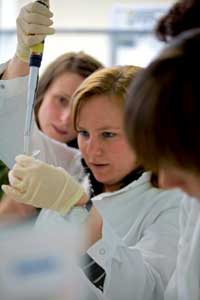
Experiencing different approaches to teaching – and different cultures – was very much a part of Jeanne’s own training, not as a teacher, but as a scientist: she studied for a Baccalaureate in experimental sciences (série D) in France, a BSc and MSc in chemistry in the USA, and a PhD in chemistry in Germany, synthesising new compounds and testing their structures. What drove her to swap the lab for the classroom? A poignant personal experience, and a desire to be more involved in ‘the real world’, she says.
“I had a rather unusual and particularly important, though extremely sad, experience in my private life. My son Albert was three years old when we discovered he had a brain tumour. He was put on therapy and really became very mature during that last year of his life. This sad event awakened in me a fascination for children and their development, and triggered a wish to participate in this process. I felt that as a chemist I had been too busy with matter and far too remote from people.
“I felt too detached from the outside world and real life. Luckily, I was able to start teaching life science, earth science and physical science at a private international school in Germany run by an American director, since my experience teaching undergraduates during my PhD would have been sufficient qualification in the United States.”
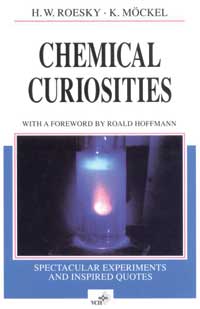
Later, Jeanne heard about the shortage of science teachers in Lower Saxony. “This shortage meant they also accepted qualified scientists with a minimum of three years’ teaching experience, which I had. So I applied for a teaching position, but before I became a staff member in a particular school, I thought it would be helpful and interesting to try different schools.”
Jeanne believes that being a scientist was an added advantage. “I can communicate my passion for science. Since I spent several years of my life in a laboratory, that makes it sound more credible to the students.”
It was also during her scientific training that Jeanne came into contact with an approach she has found very successful in motivating students: the Christmas performance. “My PhD professor in Göttingen, Germany, Herbert W. Roesky, was well known for his chemistry Christmas performances and wrote a best-seller about them (Roesky & Möckel, 1996). I adapted the idea for the classroom, when I was teaching at Gymnasium Ganderkesee just before the Christmas break. At this time of year, I had some freedom to mix and combine classes, and we prepared the event in the students’ spare time. Ninth- and tenth-graders (aged 15-17) performed spectacular experiments for their fellow students, whereas the younger sixth-graders (aged 12-13) ran easier ones and read some beautiful quotes – for example from Goethe or Hermann Hesse – which were related to the experiments.
“The students chose the experiments themselves – each trying to get the most spectacular ones, of course – so there was excitement for everybody.”
“The Elements, who doth not know,
Their energies,
Their properties,
The Spirits’ Master
Ne’er will grow!”
Johann Wolfgang Goethe, Faust Part I
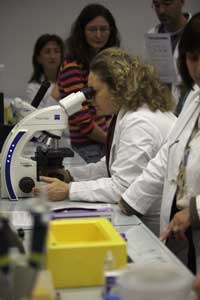
Always ready for innovation, Jeanne embraces computers and the potential they bring to the classroom. “The computer lab always lifts everyone’s spirits,” she says. “In physics for example, computers or electronic white-boards enable us to work with animations, digital quizzes or crosswords, which the students love. At high-school level, when we talk about haemoglobin, sickle cell anaemia and oxygen transport in the blood, I like to work with programmes that provide 3D images of molecular structures, such as RasMol or RasWinw1. Working with macromolecules in 3D can be a lot of fun.”
As helpful as these strategies are, Jeanne is also keen to stress the importance of teaching the methods and concepts of science. “In Germany, the new curricula for science emphasise the experimental side of teaching. This means students can experience what ‘experimental sciences’ really mean, and, since they have to be able to plan and perform their own experiments, teaching becomes interactive, too: it’s not one-way anymore. The new curricula also emphasise conceptual aspects, which is great, because concepts are very important in science. If you understand them, you do not need to learn so much by heart,” Jeanne tells us, and her students.
“Hands-on activities are a great way of motivating students, and helping them understand the concepts,” she explains. “A good example for physics classes is the self-made battery: whether it is called the potato clock, the lemon clock or the mud clockw2, it is always a great hit! And it is such a nice way to explain a difference in potential, because if you put the same metal on both sides, it does not work.
“In biology classes, a big hit for young and old is the extraction of your own DNA; it’s a classic. Whether I run it in grade 7, 9 or 11, the students always leave holding their glass vials with radiant faces, as if they had just met Santa Claus! I usually invite school directors to this experiment, and they are always surprised by how good a mood it spreads among students.”
To Jeanne, hands-on activities are not limited to scientific experiments, though. “Another simple but great idea for young biology students is to let them make their own 3D plant cell. If the school has arts or handicraft classes, this can be done as a joint project. The students usually create a wonderful collection of beautiful cells made of all kinds of materials – they have a lot of imagination! Multidisciplinarity can also come into play in larger projects like science fairs, which are always a big success. Projects can include pieces of art representing the solar system, renewable energy sources, volcanoes and so on.”
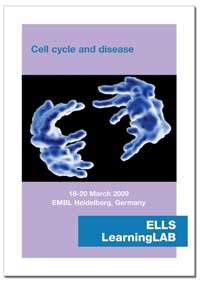
Forever in search of new ideas, Jeanne keeps on the lookout for training opportunities of her own, even though substitute teachers have to find their own funding to attend such events.
“Teacher training activities are very useful, as they give you the distance to evaluate your work and the opportunity to improve its quality, with new ideas and techniques. I recently attended a LearningLab on cell cycle and diseasew3, organised by the European Learning Laboratory for the Life Sciences (ELLS)w4 in Heidelberg, Germany. It was organised as a combination of seminars and practical activities. We learned innovative and inspirational science teaching in a very nice atmosphere and met scientists as well as colleagues from all over Europe. As a teacher, what I find really helpful are usually little experiments, which are not very complicated to prepare, run or finance, and which I can easily integrate in my classes at any time. Of course, more challenging experiments are also useful to provide insights into a new field or illustrate important concepts, but one does not run them very often. The good thing about the ELLS workshops is that they provide us with both.”
And for both students and teachers, Jeanne concludes: “Fun is an important factor in the learning process. No fun is a closed door, whereas fun is an open door.”
References
- Roesky HW, Möckel K (1996) Chemical Curiosities: Spectacular Experiments and Inspired Quotes. Weinheim, Germany: Wiley-VCH. ISBN-13: 978-3527294145
Web References
- w1 – You can download RasMol and RasWin for free here: http://rasmol.org
- w2 – The potato clock:
- The lemon clock:
- One of many suppliers of the mud clock kit: www.toysandlearning.co.uk/make-your-own-mud-clock.htm
- w3 – LearningLab on Cell Cycle and Disease: www-db.embl.de/jss/EmblGroupsOrg/conf_122
- w4 – To learn more about ELLS, see: www.embl.de/ells
Review
Changing times in the world of work: perhaps the opportunity to teach peripatetically could be the answer for those who haven’t obtained, or perhaps indeed don’t want to commit to, a permanent post. Jeanne’s experiences certainly provide food for thought about the possibilities and challenges of substitute teaching.
Marie Walsh, Republic of Ireland





